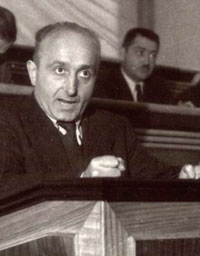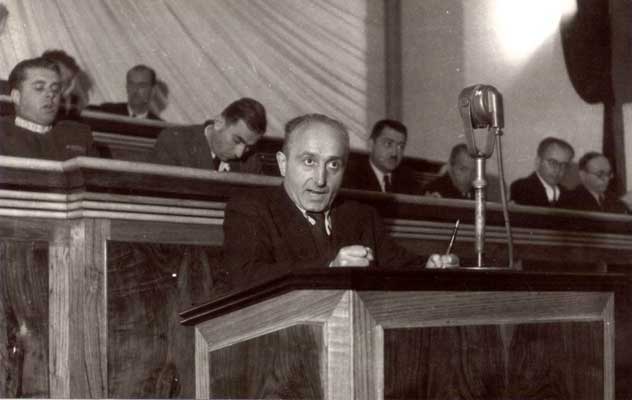Sejfullah MALËSHOVA

The forced marriage between Albanian literature and Marxism-Leninism was firmly cemented from the start with the founding in October 1945 of the Albanian Writers' Union. Initially, responsibility for cultural policies in post-war Albania was conferred upon the poet Sejfulla Malëshova (1901-1971), who used the penname Lame Kodra. Originally from the Përmet region of southern Albania, Malëshova spent a good deal of his life abroad. Most of the verse of this self-styled rebel poet was written in exile and was published in the now rare volume Vjersha, Tirana 1945 (Verse). He had studied medicine in Italy and in 1924, at the age of twenty-three, became Fan Noli's personal secretary in the latter's democratic government. With the overthrow of Noli, Malëshova fled to Paris and from there, inspired by the October Revolution, he continued on to Moscow where he studied and later taught Marxism. In the Soviet Union he joined the Communist Party (1930-1932) but was subsequently expelled as a Bukharinist. As minister of culture in the communist-controlled provisional government, Malëshova followed a relatively liberal and conciliatory course in order to encourage the reintegration of non-communist forces into the new structures of power. He was not one to condemn all prewar writers such as Gjergj Fishta as reactionaries, nor was he in favour of a total break with the West. Malëshova soon became the spokesperson of one of the two factions vying for power within the party. With the backing of the Yugoslav communists, however, the faction of his adversary Koçi Xoxe (1917-1949) gained the upper hand by early 1946 and Malëshova fell into disgrace. At a meeting of the Central Committee on 21 February 1946, Malëshova was accused of opportunism and right-wing deviationism and was expelled both from the Politburo and from the Central Committee.
Strangely enough, Sejfullah Malëshova survived his fall. This left-wing idealist who had once been a member of the Comintern was interned in Ballsh for two or three years and spent all his later life in internal exile as a humble stock clerk in Fier where, for years, no inhabitant of the town dared speak to him. His only social contact was to play soccer with the children. Whenever anyone approached he would pinch his lips with his fingers, signifying the vow of eternal silence which ensured his survival.
Sejfullah Malëshova died on 9 June 1971 of appendicitis in unimaginable isolation. Although everyone in town knew his poems by heart, no one dared to attend his funeral. He was buried in the presence of his sister, the gravedigger and two Sigurimi agents.
|
BACK


![]()
